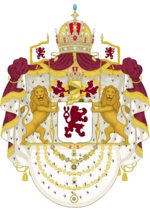History of Werania
Part of a series on the |
|---|
| History of Werania |
   |
The concept of Werania as a distinct region in northern Euclea can be traced to Solaria commander Gaius Pompeius Caesar, who referred to the unconquered area north of the Vrahn as Transtarcwrania, thus distinguishing it from Gaullia (Gaullica), which he had conquered. The victory of the Weranic tribes in the Battle of the Hanau Plains (AD 9) prevented annexation by the Solarian Empire.
Prehistory
Early cultures
The discovery of the Mauer 1 mandible in 1907 shows that ancient humans were present in Werania at least 600,000 years ago. The oldest complete hunting weapons ever found anywhere in the world were discovered in a coal mine in Lauf, Werania in 1995 where three 380,000-year-old wooden javelins 6-7.5 feet (1.8-2.3 meter) long were unearthed. The Goel valley in Werania was the location where the first ever non-modern human fossil was discovered and recognised in 1856; the new species of human was named Goelerthal man. The Goelerthal 1 fossils are now known to be 40,000 years old. At a similar age, evidence of modern humans has been found in caves in Jura near Forach. The finds include 42,000-year-old bird bone and mammoth ivory flutes which are the oldest musical instruments ever found, the 40,000-year-old Ice Age Löwenmensch figurine which is the oldest uncontested figurative art ever discovered, and the 35,000-year-old Venus of Mozenborn which is the oldest uncontested human figurative art ever discovered.

